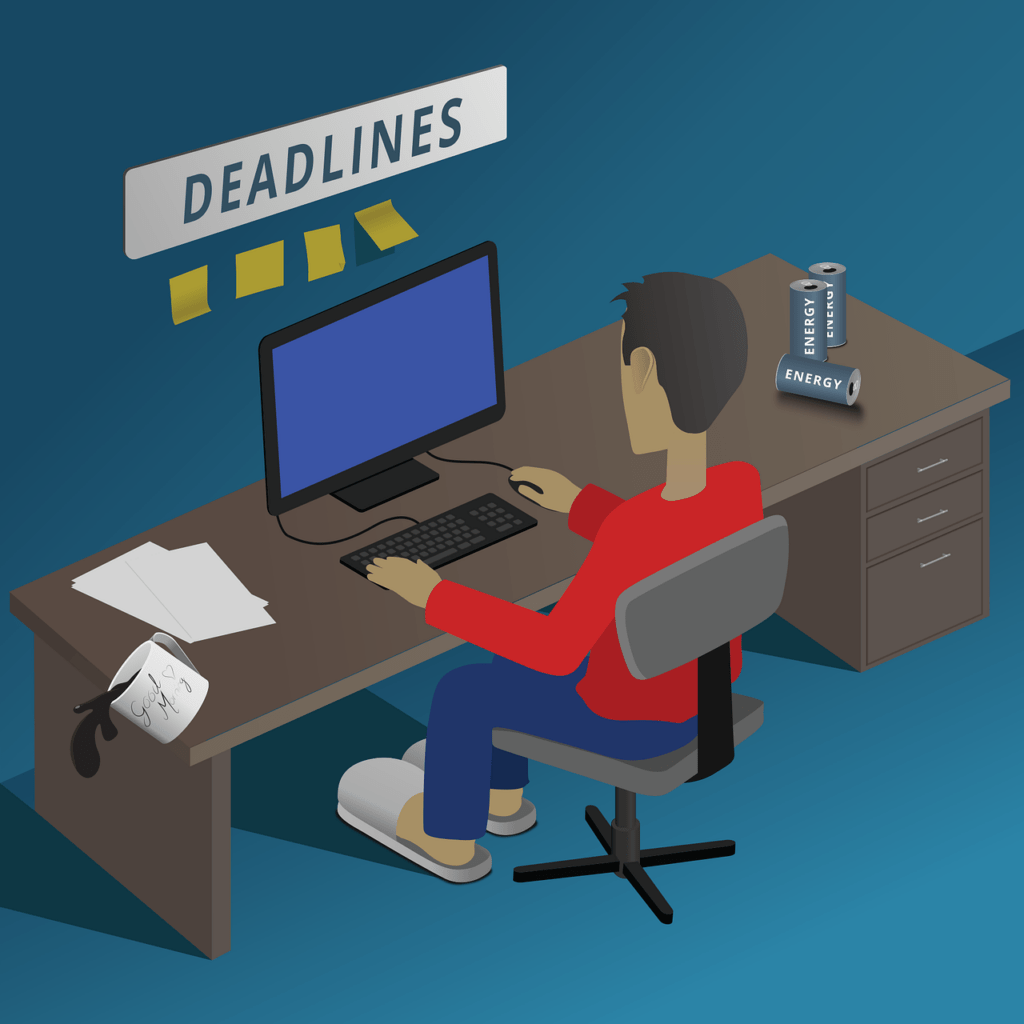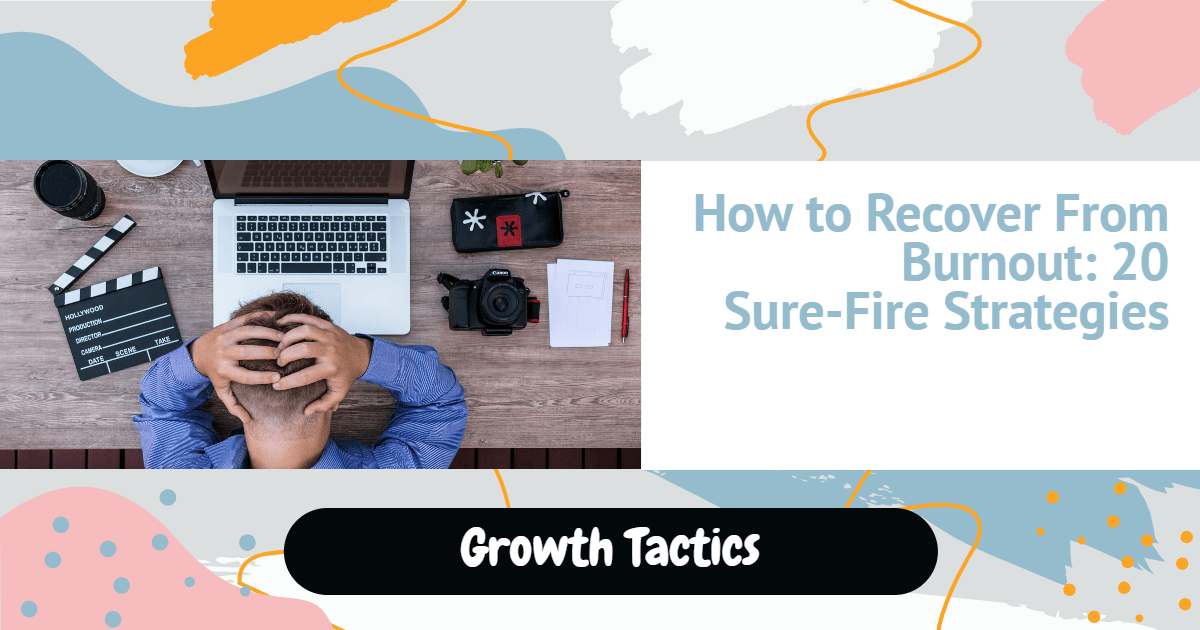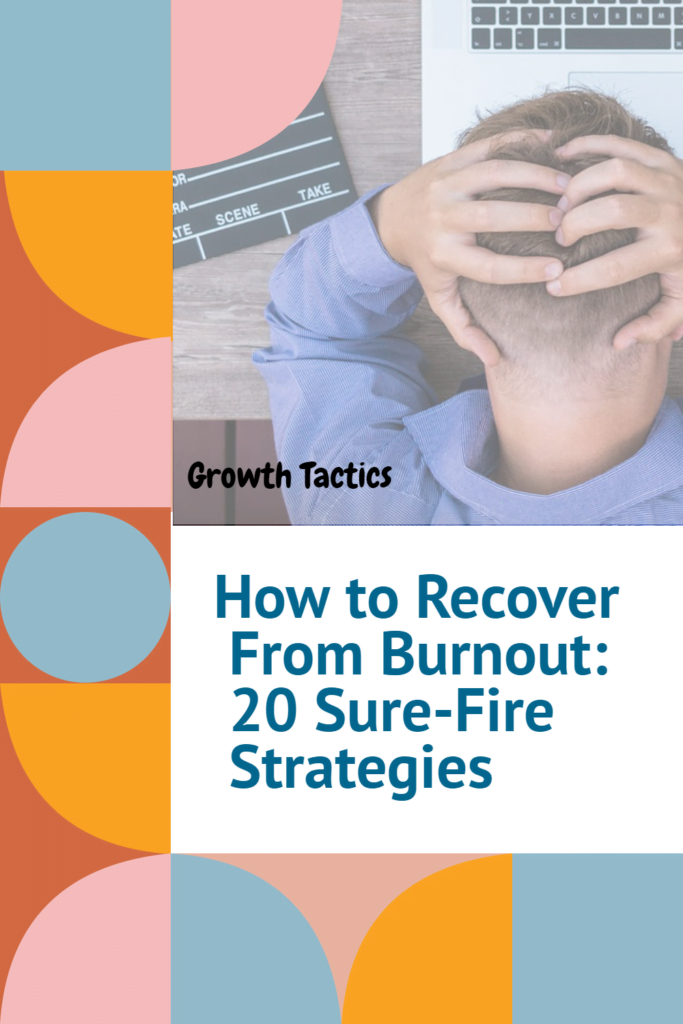Like many, I’ve journeyed through the peaks and valleys of life, encountering my fair share of burnout along the way. It’s a common thread woven into the fabric of our daily hustle, often leaving us feeling exhausted and detached. However, through these experiences, I’ve gathered a treasure trove of strategies that have helped me recover from burnout. Sharing these insights feels like passing on a map to those also traversing this rugged terrain, hoping to offer some guidance and relief.
Jump To Section
What is Burnout?
Burnout is a state of physical, emotional, and mental exhaustion caused by prolonged or repeated stress. The main symptoms of burnout include emotional exhaustion, cynicism, detachment from your job, and a lack of accomplishment or reduced productivity.
Burnout often happens as a result of chronic workplace stress. Some of the most common causes of burnout include:
- Work Overload – When the demands of the job exceed your capacity over an extended period of time. This can include having too much work to do without enough time or resources.
- Lack of Control – Not having enough authority or agency around managing responsibilities or making decisions.
- Insufficient Reward – Feeling like you’re not being adequately compensated or recognized for your efforts.
- Unfair Treatment – Experiencing inequitable discipline, inconsistent expectations, or discrimination at work.
- Clashing Values – When your personal ethics and ideals differ from the way your organization operates.
Prolonged exposure to these chronic stressors can gradually push you to physical, mental, and emotional exhaustion or burnout.
Common Signs That You May Be Experiencing Burnout

Burnout often manifests with telltale signs and symptoms. Being aware of these can help you identify burnout early and take action. Some of the most common signs of burnout include:
Physical Exhaustion
Feeling constantly drained and depleted is one of the hallmark burnout symptoms. You may notice that you have little energy to get through each day and even small tasks seem exhausting. Headaches, muscle aches, weakness, and fatigue are common. You just feel physically worn out, like you’re “running on empty.”
Emotional Exhaustion
In addition to physical exhaustion, burnout takes a toll mentally and emotionally. You may feel helpless, hopeless, and unable to cope with stress and pressure. Anxiety, irritability, sadness, and detachment from loved ones are common. You may lack motivation, feel disillusioned with your job, or question the value of your work.
Feeling Cynical/Detached
Burnout can cause you to become cynical, critical, and detached in your job. You may develop a “don’t care” attitude, view everything through a negative lens, and withdraw from colleagues. This emotional distancing is a way to cope with overwhelming stress.
Decreased Performance
When you’re burned out and stress levels are high, your performance and productivity inevitably suffer. You may struggle with concentration, procrastinate on tasks, or make more mistakes. Your decision-making abilities also decline. You may feel like you’re constantly underperforming no matter how hard you try.
Lack of Motivation
One of the paradoxes of burnout is that people often work even harder to compensate for declining motivation and performance. You may feel compelled to put in longer hours but derive little joy or satisfaction from your work. Even activities you once enjoyed lose their appeal. You’re just going through the motions without any passion or purpose. This loss of motivation just exacerbates the feelings of inefficacy.
Why Recovering from Burnout Takes Time

Burnout is the result of prolonged stress. When we are under chronic stress, our body’s stress response has been overactivated for an extended period of time. The hormones adrenaline and cortisol flood our system, leading to exhaustion.
Recovery takes time for the body to reset itself after operating in such a heightened state of stress for so long. Returning to a normal, healthy state is a gradual process. Some experts say it can take 6 months to a year to fully recover from burnout.
The body needs time to rebalance hormones and neurotransmitters that have been dysregulated. Our nervous system needs to shift out of that constant “fight or flight” mode and back into a calm, restorative state. This allows our energy to be replenished.
Sleep, relaxation, healthy nutrition and other lifestyle factors all support this recovery process. But the body has its own internal clock for healing, and we simply need to give it the time and space it requires.
Rushing back into the same stressful environment or workload that led to burnout in the first place will likely hinder the recovery process. It takes patience and self-care to help your body and mind fully bounce back. Give yourself permission to take it slow and focus on your health.
Lifestyle Changes to Prevent Burnout
To prevent burnout from recurring, it’s important to make sustainable lifestyle changes. This involves taking a holistic approach to improve your physical, mental, and emotional health.
Exercise Regularly
Getting regular exercise is vital for managing stress and preventing re-burnout. Aim for 30-60 minutes of moderate exercise most days of the week. This could include walking, jogging, cycling, swimming, or strength training. Physical activity releases endorphins which boost mood and reduce feelings of anxiety and depression. It also improves sleep quality. Try to find activities you enjoy so you can stick with it long-term.
Eat a Healthy Diet
Your diet directly impacts energy levels and mental health. Eat plenty of fruits, vegetables, whole grains, lean protein, and healthy fats. Limit processed foods, sugar, and caffeine which can exacerbate stress and cause energy crashes. Stay hydrated by drinking water throughout the day. Nutrient-dense foods will help you better cope with daily stressors.
Take Regular Vacations
It’s essential to take regular vacations from work to unwind and recharge. Avoid checking work email or taking calls during your time off. Do activities you find relaxing and enjoyable. If you don’t take regular vacations, burnout will inevitably recur. Aim to take at least 1-2 weeks off per year. Long weekends can provide mini-breaks too.
Practice Mindfulness
Mindfulness practices like meditation, deep breathing, and yoga help manage stress. Set aside time each day to clear your mind. Focus on the present rather than dwelling on the past or future. Apps like Calm, Headspace, and Insight Timer provide guided meditations. Mindfulness lowers cortisol levels, reducing feelings of anxiety and overwhelm.
Set Work Boundaries
A major way to prevent burnout is establishing boundaries at work especially if your burnout is work-related. Don’t regularly work overtime or weekends. Set limits with co-workers and managers on your availability outside working hours. Learn to say no to extra duties that are unrealistic for your schedule. Protect your personal time as much as possible.
Coping with Caregiver Burnout

Caring for a loved one can be extremely rewarding, but it can also lead to burnout if you don’t take time for self-care. Caregiver burnout is incredibly common, with an estimated 40-70% of caregivers suffering from it. The physical and emotional demands of caregiving mean that you’re at a higher risk for burnout. Here are some tips to cope with caregiver burnout:
Take advantage of respite care. Respite care provides short-term relief so you can take a break. You may be able to find community programs that provide respite care services. Taking regular breaks is key to avoiding burnout.
Join a caregiver support group. Connecting with others who understand your challenges can provide emotional support. Support groups allow you to share stories and tips for coping. You can likely find local groups or online communities.
Ask family and friends for help. Don’t try to do everything yourself. Asking others to help with errands, and appointments, or giving you a break can make a big difference. Explain specific ways they can help support you.
Prioritize self-care. Make time for healthy habits like exercise, nutritious meals, and adequate sleep. Also, schedule time for hobbies you enjoy. Taking care of yourself should be part of your caregiving plan. Relaxation techniques like meditation can also help manage stress.
Caregiver burnout is common but there are ways to prevent and cope with it. Support, respite care, and self-care will help you continue providing care while avoiding exhaustion. Don’t be afraid to speak up about the help you need.
Changing Jobs or Careers to Overcome Burnout
If you’ve reached a point where your current job or career is the primary cause of your burnout, it may be time to consider a change. But changing jobs or careers can seem overwhelming when you’re already burnt out and exhausted. Here are some tips for making the transition:
How to determine if a new job/career will help: The most important thing is to identify what specifically is causing your burnout in your current role. Is it the type of work? The company culture? Lack of work-life balance? Are your skills not matching the job requirements? Once you’ve pinpointed the factors, you can then look for a new job or career that avoids those pitfalls. Speak to others who have made a similar transition to understand the reality of the new role.
Planning finances for the transition: Changing careers may require going back to school or taking a pay cut initially. Create a budget to determine what lifestyle changes may be needed and how long current savings can sustain you. Explore financial assistance like scholarships, grants, loans, crowdfunding, etc. Reduce expenses where possible and build up emergency savings. Consider taking on part-time or freelance work related to your new field.
Networking tips: Start connecting with people in your desired new career, through online communities, professional associations, events, informational interviews, mentors, etc. Look for opportunities to gain relevant experience through volunteering, internships, or side projects. Make use of your existing network and ask for introductions or referrals.
Transferrable skills: Identify skills from your current role that apply to the new career, such as communication, analytical thinking, project management, etc. Reframe past experiences on your resume to highlight these transferable skills. Take online courses to gain additional skills. Obtain certifications that are valued in your new industry. Highlight the unique value you can bring from your different background.
The key is being strategic and proactive as you work towards changing careers. Having patience and persisting through the challenges will help you reach your goal of finding a new and better job that avoids the burnout problems of the past.
Learning to Set Boundaries at Work

Setting healthy boundaries at work is crucial to prevent and recover from burnout. When you’re burnt out, it can feel impossible to set limits, but this is exactly when you need them most.
Determine top priorities – Make a list of your most important tasks and focus on those first. Let go of perfectionism for lower priority items. Learn to delegate or remove unnecessary work.
Say no respectfully – It’s ok to say no to extra projects and responsibilities when you’re overwhelmed. Politely explain that you have a lot on your plate but appreciate being considered. Offer to help later when your workload eases up.
Leave work at work – Resist the urge to check emails and take work calls outside of work hours. Allow yourself to mentally unplug and recharge. If critical, set a time limit for after-hours work.
Take regular breaks – Go for a short walk, chat with a coworker, or do some stretches at your desk. Short mental breaks will improve your focus and prevent burnout.
Developing Healthy Coping Mechanisms
Burnout can often be caused by an inability to cope with high-stress levels over extended periods of time. Developing healthy coping mechanisms is key to recovering from burnout and preventing it from recurring. Here are some strategies:
Identify your stressors. Take time to reflect on the different stressors in your work and personal life. Are there certain triggers that consistently cause you high anxiety or fatigue? Are there tasks or responsibilities that you find particularly draining? Pinpointing stressors can help you better manage them.
Exercise regularly. Physical activity has been proven to reduce stress and boost mood. Aim for 30-60 minutes of exercise per day, whether it’s walking, running, swimming, cycling or strength training. Even light exercises like stretching or yoga can help calm your mind and body.
Try meditation or mindfulness. Practices like meditation, deep breathing, and mindfulness have demonstrated benefits for mental health. Set aside 10-15 minutes per day to sit quietly, focus on your breath, and bring awareness to the present moment. Apps like Calm, Headspace and Insight Timer can guide you.
Keep a journal. Writing about stressful events, worries or emotions can help process them. Journaling allows you to reflect, gain insights and develop greater self-awareness. Studies show journaling may help reduce anxiety and improve mental health.
Build your support system. Don’t underestimate the value of connecting with others. Spend time nurturing relationships with people you trust. Share your feelings with at least one supportive friend, family member, mentor, or support group.
Consider therapy or counseling. If you’re struggling to manage stress on your own, seek professional help. Psychologists and counselors can provide tools to improve coping, address underlying issues, and change unhelpful thought patterns contributing to burnout.
Developing and practicing healthy coping strategies makes you more resilient to stress. With time, they can help you better manage emotions, reduce anxiety, and prevent re-burnout.
When to Seek Professional Help for Burnout
Burnout can take a serious toll on both your mental and physical health. While lifestyle changes and self-care strategies can help you recover, there are times when it’s important to seek professional help:
Depression or Excessive Anxiety
If you are experiencing severe or persistent feelings of depression, hopelessness, or anxiety, this may be a sign that burnout has progressed into something more serious. Many of the symptoms of burnout and depression overlap, including exhaustion, cynicism, and detachment. However, with clinical depression, you may experience more intense and unrelenting symptoms that make it difficult to function day-to-day. Seeking help from a mental health professional can help determine if depression is a factor and help you recover.
Physical Health Issues
Chronic stress from burnout can manifest in a variety of concerning physical symptoms, including chest pain, heart palpitations, dizziness, fainting, digestive issues, and headaches. If you are experiencing any unusual or worsening physical symptoms along with burnout, it’s important to see a medical doctor. They can rule out any underlying health conditions and help you get appropriate care.
Difficulty Functioning Normally
If burnout is making it extremely difficult for you to carry out normal daily tasks and responsibilities, whether at work, at home, or in social settings, this may be a sign it’s time to seek outside support. A therapist can help you learn techniques to cope with the exhaustion, mental fog, and cynicism caused by burnout. They can also help you determine necessary lifestyle changes to improve your ability to function.
Suicidal Thoughts
Having thoughts of death or suicide can be an alarming sign of advanced burnout. If you experience any suicidal thoughts or feelings, seek help right away. Call a suicide hotline or your doctor’s emergency number to speak with someone immediately. You can also go to your nearest emergency room. With professional support, you can overcome these suicidal thoughts and recover from burnout.
If you enjoyed this article on how to recover from burnout check out some of our other great articles below.








